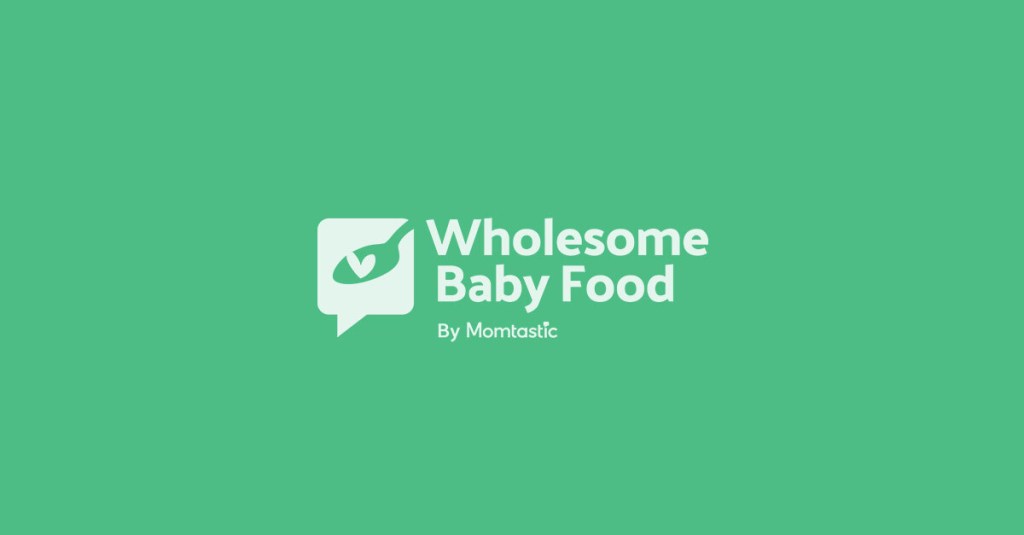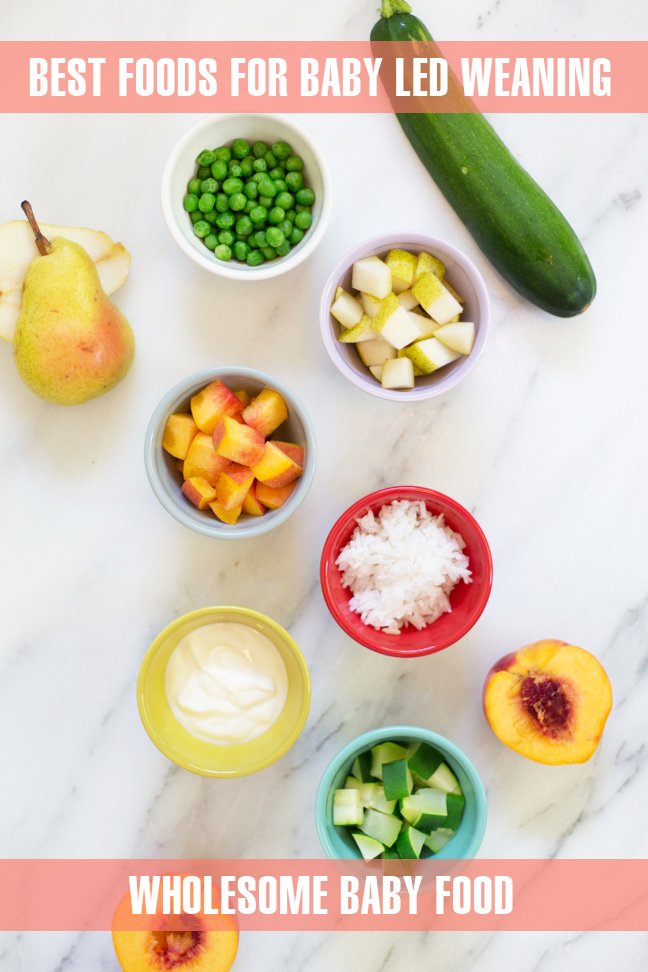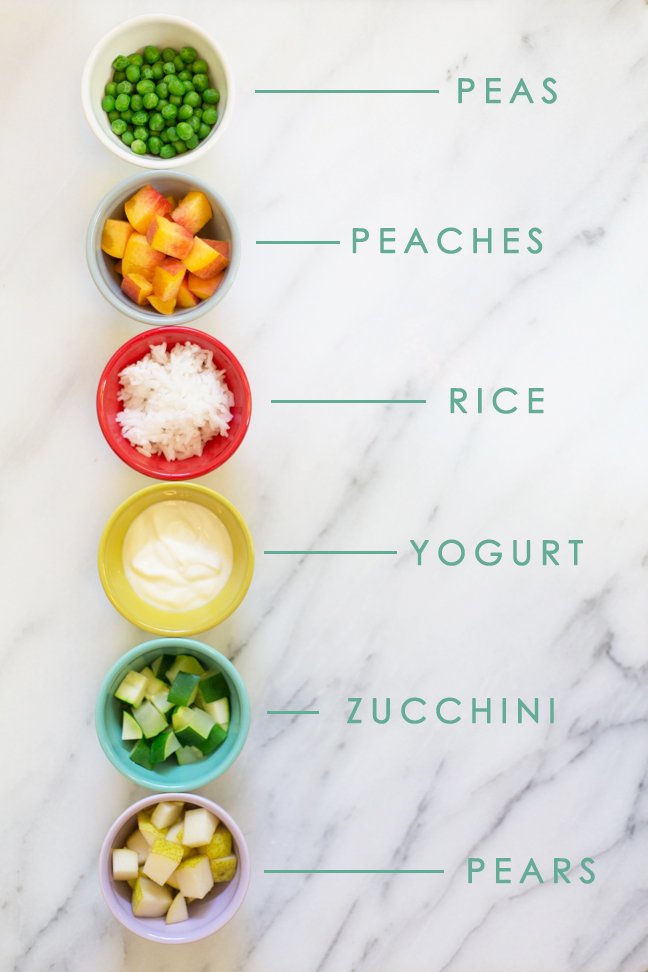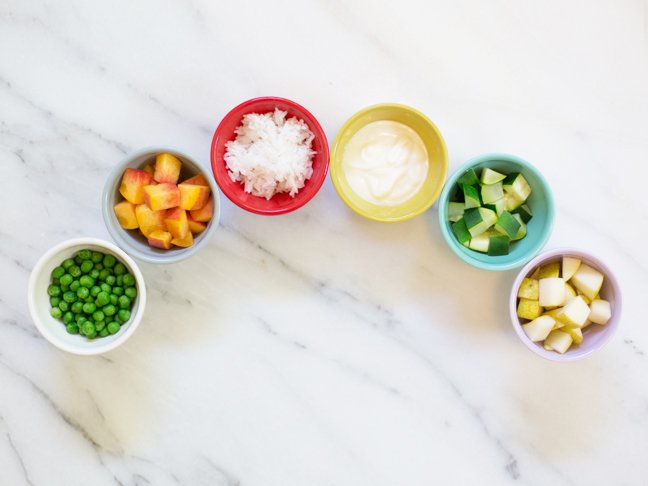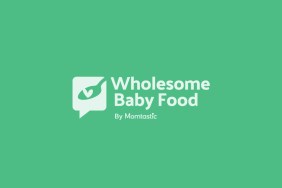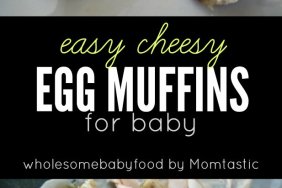Food Ideas for Babies Eating Using the Baby Led Weaning Method
Using a Baby Led Weaning method to introduce solid foods to your baby is a great way to start babies eating really fresh and wholesome foods. One of the benefits of Baby Led Weaning is that you won’t be spending time pureeing and freezing; nor will you be spending time spooning food into baby’s mouth.
For many parents, the fast and easy method of Baby Led Weaning is the perfect way to introduce baby to solid foods. Visit the Baby Led Weaning page to learn all about BLW!
What is a good age for Baby Led Weaning?
![]()
Babies should be at least 6 months of age if you wish to use the BLW method of introducing solid foods. They should be able to sit up unassisted, have lost the tongue thrust reflex and should be able to grasp and hold onto foods. Good starter foods for BLW are those found in the charts for the 4-6 month range and the 6-8 month range.
Starting Solid Foods with Baby Led Weaning – Timing and Ideal Foods to Begin With
If you are going to try the BLW approach, it is most important that you try to start solids no earlier than 6 months of age. At this age (the most recommended age for beginning solid foods), your baby should be sitting up unassisted or with little assistance. Your baby should also have good head control as well as a good fist grasp and a developing pincer grasp. The tongue-thrust reflex should also have disappeared by this age. These milestones are very important as your baby will be feeding himself; he should not be propped up or reclined back because he will be eating whole foods.
Some of the very same foods that you would cook and puree as starter foods for your baby make wonderful starter foods for BLW too! Here are a few top picks with more on the way soon!
Apples – You may offer babies apples as early as 6 months of age. You can simply wash and peel the [raw] apple and give it to your baby to gnaw on or you can cut it into large chunks. Bake the apples and mash them in a bowl as a great way to let baby really get into feeling his foods.
Avocado – You won’t be able to find another fruit that is more packed full of essential nutrients than the avocado. Avocado makes a great BLW choice as its taste is pleasant and it’s easily digested. You can make a “baby guacamole” or cut it into large dices and mash it.
Bananas – You may want to offer baby a banana that has been mashed so that there is more control over the portion that she will be eating. Yes, it will be really messy but she’s learning about food with all of her senses and this is important! Some parents report that they have given their babies a halved (and peeled) banana that was not too ripe so that the texture was firm. Please use your judgment when offering a whole or halved banana to your little one!
Cooked Rice or other grains like kamut – Cook up some grains and then let your baby pick at and eat them. Once he has been introduced to a variety of foods, you will be able to mix all sorts of healthy and tasty foods into his rice meals!
Sweet Potatoes – Baked or steamed sweet potato is a wonderful beginner food. You can cut it into thick sticks and bake like fries or steam it and then mash it a bit.
Scrambled Egg Yolks (or whole eggs) – Scrambled eggs are a great baby led weaning food as they are soft, tasty and easily manageable. Recommendations for introducing egg yolks & white are changing and some pediatricians are saying they are a great starter food. Learn more about eggs
How Much Should My Baby Eat? “Following your baby’s cues during feeding time will ensure that your baby is eating the proper amounts of food for him or her.” You see, the majority of healthy babies will eat just the right amount of foods that they need. Many who advocate Baby Led Weaning believe that babies who feed themselves early on are better able to control just what their bodies need to nourish them.
Tip! Offering your baby a well balanced diet of solid foods will help ensure that your baby is eating the right amount of the right foods.
Photos by Chelsea Foy
![]() Remember, always consult with your pediatrician regarding introducing solid foods to your baby and specifically discuss any foods that may pose allergy risks for your baby.
Remember, always consult with your pediatrician regarding introducing solid foods to your baby and specifically discuss any foods that may pose allergy risks for your baby.
![]() This site complies with the HONcode standard for trustworthy health information:
This site complies with the HONcode standard for trustworthy health information:
verify here.
